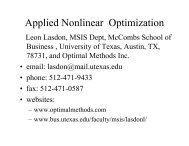[PDF] ALIO Back Matter
[PDF] ALIO Back Matter
[PDF] ALIO Back Matter
Create successful ePaper yourself
Turn your PDF publications into a flip-book with our unique Google optimized e-Paper software.
MA19<br />
2 - Utilizing an EPCIS System to Automate Route Classification and<br />
Optimize a Transportation Network<br />
Leif Anderson, Blackhawk Management Corporation, 13100 Space<br />
Center Blvd, HB3-30, Houston, TX, 77059-3556, United States of<br />
America, leif.anderson@boeing.com, Liang-Chieh Cheng<br />
This study introduces a framework for a transportation strategy given the prevalent<br />
RFID system enabled by EPCIS technologies, in international trade over<br />
conventional freight tracking and tracing practices. We offer a route classification<br />
scheme exclusive to auto-identification and resulting strategies which are illustrative<br />
to optimize cost and volatility inherent to transport across global markets.<br />
3 - Inventory and Distribution Management in a 1 Warehouse –<br />
N Retailers Distribution System using VMI - Vendor Managed<br />
Inventory<br />
Hector Toro, Assistant Professor, Pontificia Universidad Javeriana,<br />
Calle 18 118 - 250, Cali, Colombia, htoro@javerianacali.edu.co,<br />
Liliana Delgado<br />
The VMI (Vendor Managed Inventory) philosophy for inventory management is<br />
used as a background for setting inventory policies and making transportation<br />
decisions in a typical distribution system with one warehouse and several retailers.<br />
A combination between simulation and optimization techniques is applied to the<br />
resulting IRP (Inventory Routing Problem). A practical perspective is maintained<br />
throughout the research and results from a case study are presented.<br />
■ MA19<br />
Aula 383- Third Floor<br />
Models and Algorithms for Vehicle Routing<br />
and Dial-a-ride Problems<br />
Cluster: Logistics, Vehicle Routing and Location<br />
Invited Session<br />
Chair: Luis Neves Gouveia, Professor, Universidade de Lisboa - CIO,<br />
Bloco C6, Lisbon, Portugal, legouveia@fc.ul.pt<br />
1 - Hop-indexed Circuit-based Formulations for the Travelling<br />
Salesman Problem<br />
Luis Neves Gouveia, Professor, Universidade de Lisboa - CIO,<br />
Bloco C6, Lisbon, Portugal, legouveia@fc.ul.pt, Maria Teresa<br />
Godinho, Pierre Pesneau<br />
We discuss a new Hop-indexed Circuit-based formulation for the TSP. We show that<br />
the new formulation enhanced with some valid inequalities produces very tight<br />
linear bounds (with emphasis on the so-called cumulative TSP). We show that the<br />
new enhanced formulation dominates the previous best (compact) formulations<br />
from the literature.<br />
2 - A Bus School Routing Problem<br />
Juan José Salazar González, Professor, Universidad de La Laguna,<br />
DEIOC - Matemáticas, Tenerife, La Laguna, TF, 38271, Spain,<br />
jjsalaza@ull.es, Jorge Riera<br />
The Multiple Vehicle Traveling Purchaser Problem aims designing a set of optimal<br />
school bus routes with the purpose of carrying pupils to their center of learning in<br />
an urban surroundings.<br />
3 - A Hybrid Tabu Search and Constraint Programming Algorithm for<br />
the Dynamic Dial-a-ride Problem<br />
Gerardo Berbeglia, HEC Montréal, 809 Marie Anne Est, Montréal,<br />
QC, H2J 2A7, Canada, gerardo.berbeglia@hec.ca, Gilbert Laporte,<br />
Jean-François Cordeau<br />
We present a hybrid algorithm for the dynamic dial-a-ride problem in which service<br />
requests arrive in real time. The algorithm combines an exact constraint<br />
programming (CP) algorithm and a tabu search (TS) heuristic. An important<br />
component of the TS heuristic consists of three scheduling procedures. Experiments<br />
show that the CP algorithm is sometimes able to accept or reject incoming requests,<br />
and that the hybrid method outperforms each of the two algorithms when they are<br />
executed alone.<br />
<strong>ALIO</strong> / INFORMS International – 2010<br />
54<br />
■ MA20<br />
Aula 382- Third Floor<br />
Cutting and Packing 3<br />
Cluster: 7th ESICUP Meeting<br />
Invited Session<br />
Chair: Ramón Alvarez-Valdés, Professor, University of Valencia, Dept.<br />
Statistics and O.R., Doctor Moliner 50, Burjassot, 46100, Spain,<br />
ramon.alvarez@uv.es<br />
1 - A Hybrid Algorithm for Container Loading with Load Bearing<br />
Constraints<br />
Maria Teresa Alonso, Universidad Castilla-la Mancha, Parque<br />
Cientifico y Tecnologico s/n, Albacete, 02071, Spain,<br />
mai.alonso@gmail.com, Jose Tamarit, Ramón Alvarez-Valdés,<br />
Francisco Parreño<br />
We have developed a hybrid algorithm for the three-dimensional container loading<br />
problem with full support for the boxes and load bearing constraints. Embedded in a<br />
GRASP structure we have designed a constructive algorithm inspired on Ngoi’s box<br />
placement and a VND procedure for the improvement phase using increasingly<br />
aggressive moves.<br />
2 - Approaches for 3D-container Loading Problems with<br />
Multi-drop Considerations<br />
Leonardo Junqueira, Doctoral Student, Universidade Federal de São<br />
Carlos, Rod. Washington Luis - Km 235, São Carlos, SP, Brazil,<br />
leo_junqueira@yahoo.com, Denise Yamashita, Reinaldo Morabito<br />
In this work we present approaches based on mixed integer linear programming<br />
models for packing rectangular boxes into containers, considering multi-drop<br />
constraints. These constraints refer to cases where boxes that are delivered to the<br />
same destination must be placed close to each other in the container or truck, and<br />
the 3D-loading pattern must take into account the delivery route of the vehicle.<br />
Computational experiments are presented solving the approaches with optimization<br />
solvers.<br />
3 - A Hybrid Algorithm for the Vehicle Routing and Loading Problem<br />
Andreas Bortfeldt, University of Hagen, Profilstrasse 8, Hagen,<br />
58084, Germany, Andreas.Bortfeldt@FernUni-Hagen.de<br />
The 3D vehicle routing and loading problem combines capacitated vehicle routing<br />
and three-dimensional loading with additional packing constraints. An efficient<br />
hybrid algorithm, including a tabu search procedure for routing and a tree search<br />
procedure for loading, is introduced. Computational results are presented for all<br />
publicly available test instances.<br />
4 - The Special Diophantine Equations in the Computation Solution of<br />
the Certain Rectangle Cutting-packing (C/P) Problems<br />
Kovacs Lehel, Sapientia - Hungarian Unuversity of Transylvania,<br />
Târgu Mures, Romania, klehel@ms.sapientia.ro, Gyorfi Jeno<br />
The Special Diophantine Equation (SDE) is any linear polynomial equation, which<br />
allows the variables to be zero or one. For the rectangle C/P problems always can be<br />
assigned one or more SDE, depending on the dimension of the C/P problem. Based<br />
on the solutions of the SDE, we elaborated an iterative algorithm, which solve an<br />
exact or inexact C/P. The presented algorithm in essence is invariant, when the<br />
dimension of the C/P problem varies.<br />
Monday, 11:30am - 1:00pm<br />
■ MB01<br />
Aula Magna- First Floor<br />
Tutorial: Combinatorial Benders Approaches to<br />
Hard Problems<br />
Cluster: Tutorials<br />
Invited Session<br />
Chair: Michael Trick, Carnegie Mellon University, Tepper School of<br />
Business, 5000 Forbes Avenue, Pittsburgh, PA, 15213,<br />
United States of America, trick@cmu.edu<br />
1 - Combinatorial Benders Approaches to Hard Problems<br />
Michael Trick, Carnegie Mellon University, Tepper School of<br />
Business, 5000 Forbes Avenue, Pittsburgh, PA, 15213,<br />
United States of America, trick@cmu.edu<br />
Benders decomposition is an old idea in integer programming. In a Benders<br />
approach, there are two types of variables: master variables and subproblem<br />
variables. Recent work has shown the value of this approach even in cases where


![[PDF] ALIO Back Matter](https://img.yumpu.com/17932960/34/500x640/pdf-alio-back-matter.jpg)
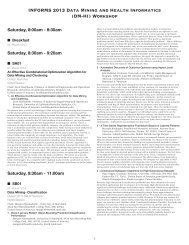
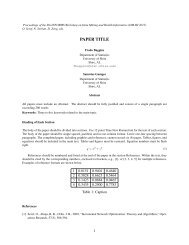
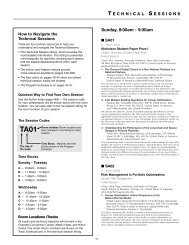
![[PDF] Charlotte Back Matter](https://img.yumpu.com/17933057/1/190x245/pdf-charlotte-back-matter.jpg?quality=85)
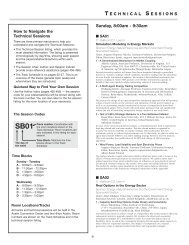
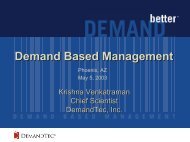
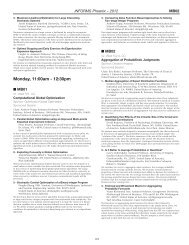

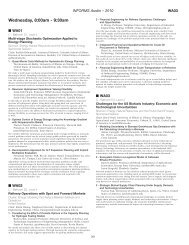
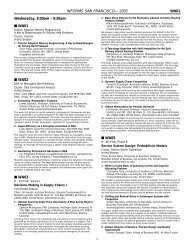
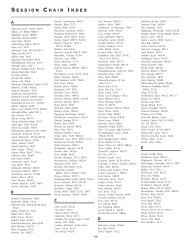
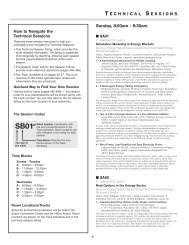
![[PDF] Monday, 8:00am - 9:30am](https://img.yumpu.com/17932954/1/190x245/pdf-monday-800am-930am.jpg?quality=85)
